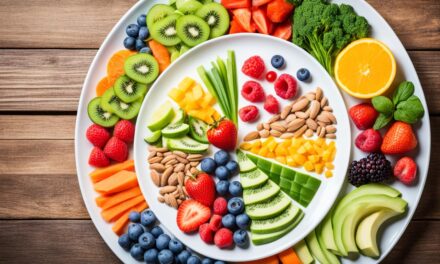Picture this: it’s been a long week of healthy eating and diligent exercise. You’ve stuck to your meal plan, said no to tempting desserts, and pushed yourself to the limits during your workouts. But now, the weekend has arrived, and you find yourself craving a little indulgence. A cheat meal sounds like the perfect reward for your hard work, right?
Many people struggle with the idea of cheat meals and whether they can actually be beneficial or if they ultimately backfire. The concept of planned indulgences is a topic of debate in the world of health and fitness. Some argue that labeling certain meals as “cheats” can create negative associations with food and lead to feelings of guilt. Let’s delve into the pros and cons to help you make an informed decision about incorporating cheat meals into your lifestyle.
Key Takeaways:
- Labeling certain meals as “cheats” can create negative associations with food and lead to feelings of guilt.
- Approaching indulgences as conscious choices can be more empowering and positive.
- When indulging, practice portion control and choose nutrient-dense options.
- Find a balance that works for you based on your individual tolerance for indulgences and health goals.
- Focusing solely on nutrients can lead to super-restrictive diets that may not be sustainable in the long term
Why the “Cheat Meal” Concept may be Problematic
The cheat meal concept, while popular in the health and fitness community, can have negative associations with food and lead to feelings of guilt and shame. The term “cheat” implies that indulging in certain foods is inherently wrong or bad, creating a restrictive and judgmental mindset surrounding our eating habits. By labeling certain meals as “cheats,” we inadvertently create a dichotomy where some foods are deemed forbidden or off-limits.
This negative mentality around food can have detrimental effects on our overall relationship with eating. It can lead to feelings of guilt and shame when we indulge in foods that are perceived as indulgent or unhealthy. Instead of fostering a balanced and enjoyable approach to food, this mindset reinforces the idea that we should feel guilty for enjoying certain meals.
This sense of restriction and deprivation can have counterproductive consequences. When we label certain foods as “forbidden,” we tend to crave them even more. The more we deny ourselves these indulgences, the more likely we are to give in to our cravings and overindulge when we finally allow ourselves to enjoy them. It becomes a vicious cycle of restriction, guilt, and overconsumption.
To overcome these negative associations with food, it’s important to shift our perspective. Rather than perceiving indulgences as cheat meals, we can reframe them as conscious choices that can be enjoyed in moderation. By adopting a more empowering and positive mindset, we can take control of our eating habits and make informed decisions that align with our overall goals and values.
Instead of viewing indulgences as cheat meals, think of them as opportunities to savor and enjoy the foods you love while maintaining a balanced and mindful approach to eating.
It’s essential to cultivate a healthy relationship with food by practicing moderation and embracing the concept of conscious indulgences. This means being aware of our portion sizes and choosing nutrient-dense options whenever possible. Opt for high-quality ingredients, such as dark chocolate with peanut butter or a baked sweet potato instead of fries.
Remember, the key is to approach indulgences with mindfulness and moderation. By letting go of the negative associations and guilt, we can establish a more positive relationship with food and make choices that align with our overall well-being and enjoyment. So, let go of the cheat meal concept and embrace the freedom and empowerment that comes with conscious indulgences.
The Downfall of Guilty Pleasures
Guilt should have no place at the table. When we label indulgences as cheat meals, we foster a sense of restriction and deprivation, leading to a constant cycle of guilt and overindulgence. Instead, let’s destigmatize the enjoyment of delicious foods and appreciate them as conscious choices that add flavor and joy to our lives.
The Benefits of Conscious Indulgences
Forget about cheat meals; it’s time to embrace conscious indulgences! Rather than labeling these delicious treats as cheats, view them as opportunities to make mindful choices. When indulging, it’s crucial to practice portion control and opt for nutrient-dense options that not only satisfy your cravings but also support your overall health.
So, how can you enjoy conscious indulgences without going overboard? Here are some tips to help you make informed choices:
- Portion Control: Instead of indulging in a whole bag of chips, satisfy your craving with a small handful. Practice mindful eating by savoring each bite and fully enjoying the flavors.
- Nutrient-Dense Options: When selecting your indulgence, choose options that provide nutritional value along with taste. For example, pair a small serving of dark chocolate with peanut butter, as the combination offers heart-healthy fats and antioxidants.
- Moderation is Key: Enjoying conscious indulgences in moderation allows you to satisfy your cravings without derailing your progress towards your health goals. Remember, it’s the overall balance that counts.
Here’s a tempting visual to inspire your next conscious indulgence:
| Indulgence | Description | Nutritional Benefits |
|---|---|---|
| Dark Chocolate with Peanut Butter | Dark chocolate provides antioxidants, while peanut butter offers healthy fats and protein. |
By approaching indulgences with mindfulness and making conscious choices, you can maintain a healthy and balanced lifestyle. Remember, it’s all about finding a sustainable approach that works for you and supports your overall well-being.
Finding a Balanced Approach
When it comes to indulging in your favorite treats, finding a balanced approach is key to maintaining a healthy lifestyle. Your individual tolerance for indulgences, along with your health goals, cravings, and overall diet, should determine the frequency and portion sizes of your indulgences.
Some individuals may be able to incorporate indulgences into their routine more frequently without jeopardizing their health goals, while others may need to limit them to once or twice a week to stay on track. It’s all about finding what works best for you and establishing a sustainable eating pattern.
Listening to your body is crucial in finding this balance. Pay attention to how certain foods make you feel mentally and physically. If indulging in certain treats leaves you feeling sluggish or guilty, it may be a sign that you need to cut back or make healthier alternatives.
Portion Control and Nutritious Pairings
To enjoy your indulgences without compromising your overall diet, practicing portion control is essential. Instead of mindlessly devouring an entire pint of ice cream, savor a small scoop with fresh berries as a satisfying treat.
To make your indulgences more balanced, pair them with nutrient-dense options. For example, if you’re craving a slice of pizza, opt for a thin-crust version loaded with veggies and lean protein instead of a greasy, deep-dish option.
Finding Pleasure in Moderation
Remember, indulging in your favorite treats is part of living a fulfilling life—not a reason to feel guilty or ashamed. By embracing a balanced approach, you can satisfy your cravings while still making progress towards your health goals.
“Finding a balance between indulgence and healthy choices is the key to creating a sustainable and enjoyable diet.” – Nutritionist Sarah Thompson
It’s important to celebrate the pleasures of food without letting it consume your overall well-being. By practicing moderation, incorporating nutritious options, and being mindful of your individual needs, you can find happiness and satisfaction in every indulgence.
The Pitfalls of Focusing on Nutrients Alone
Focusing solely on individual nutrients, such as fats, carbs, or protein, in your dietary choices? It might sound like a smart move, but beware of the super-restrictive diets that can result from it. While these diets may initially lead to weight loss, they often come with a long-term consequence: weight regain.
Instead of fixating on specific nutrients, consider the bigger picture. Calorie intake, food choices, and lifestyle factors all play a role in maintaining weight loss and promoting overall health. Balance is key.
Restrictive diets can be tough to maintain and may leave you feeling deprived and unsatisfied. It’s a vicious cycle that many find themselves trapped in, losing and regaining weight time and time again.
“Remember, the goal is not just to lose weight, but to maintain it and live a healthy, fulfilling life.”
So, what’s the alternative? Focus on a more sustainable approach that takes into account your overall well-being. Shift your attention away from solely nutrients and start considering a balanced and holistic approach to your diet.
Here are a few actionable tips:
- Aim for a variety of nutrient-dense foods to ensure you’re getting a wide range of essential vitamins and minerals.
- Pay attention to your overall calorie intake and strive for balance and moderation.
- Listen to your body’s hunger and fullness cues. It’s okay to indulge occasionally, but be mindful of portion sizes.
- Adopt a flexible mindset that allows for occasional indulgences while maintaining an overall nutritious diet.
By focusing on overall food quality, portion control, and lifestyle choices, you can break free from the pitfalls of restrictive diets and achieve a healthier and more sustainable relationship with food.
But don’t just take our word for it, consider these eye-opening statistics:
| Stat | Percentage |
|---|---|
| Weight Regain on Restrictive Diets | 85% |
| Long-term Weight Maintenance Success | 15% |
| Average Weight Regain After Dieting | 65% |
These numbers speak for themselves. Don’t fall into the trap of focusing solely on nutrients. Take a more well-rounded and sustainable approach to your diet that prioritizes your overall well-being.
Conclusion
Weight loss, a healthy lifestyle, and a balanced approach are at the heart of the debate surrounding cheat meals and planned indulgences. Some argue against the use of the term “cheat meal,” citing negative associations, while others believe in the value of mindful and moderate indulgences. The key lies in finding an approach that works for you.
To achieve a healthy and sustainable lifestyle, it’s important to consider your health goals, cravings, and overall diet. Rather than label certain meals as cheats, approach indulgences as conscious choices. Focus on the quality of food and portion control to navigate potential drawbacks and maximize the benefits.
Remember, there is no one-size-fits-all approach when it comes to indulgences. It’s about finding what works for you and listening to your body. Whether you enjoy a weekly dessert or choose to indulge less frequently, the key is moderation and self-awareness. By adopting a balanced approach and embracing a range of nutritious foods, you can achieve your weight loss goals while still enjoying the pleasures of food.
FAQ
Do cheat meals backfire? What are the pros and cons of planned indulgences?
Why is the “cheat meal” concept may be problematic?
What are the benefits of conscious indulgences?
How can I find a balanced approach to cheat meals?
What are the pitfalls of focusing on nutrients alone?
MORE SOURCES TO READ:
- https://www.allysangels.com.au/author/team/page/24/
- https://nutritiouslife.com/eat-empowered/cheat-meal/
- https://nutritiouslife.com/eat-empowered/eat-food-not-nutrients/
![]()














Recent Comments